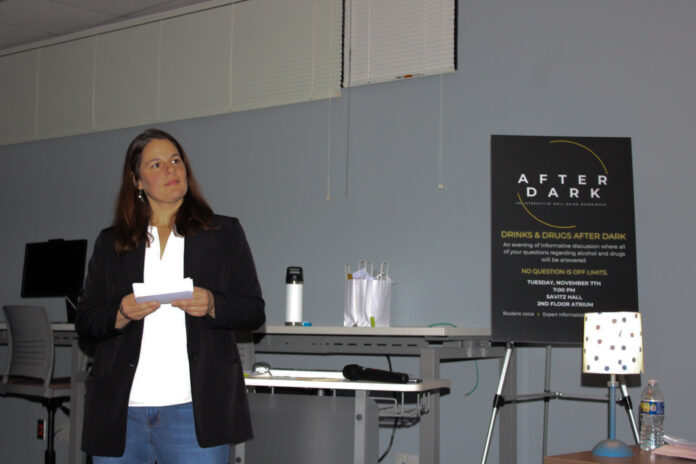In a world where drug use and alcohol consumption are typically considered vital to the collegiate experience, Rowan is taking a different approach. On Nov. 7, the university conducted its first “After Dark” event, which included a panel discussion addressing campus substance usage and alcohol-related problems.
Drew Davenport and Kristen Miranda are academic support coordinators and Substance Abuse and Mental Health Services Administration (SOAR) navigators, respectively. Their major job is to assist students in gaining access to academic resources, to give academic performance assistance, and to link individuals battling with drug abuse to the relevant services.
Davenport, a Rowan University alumnus, described his career, which began with a major in psychology before transferring into the realm of higher education. His responsibility is to act as a liaison between students and academic support services, ensuring that they receive the necessary assistance.
Miranda specializes in assisting students who are on academic probation. She emphasizes the need to develop personal connections with pupils in order to understand their impediments to academic success and support them in overcoming these obstacles.
“My role is really to meet them where they are as human beings,” said Miranda, “focus on creating initiatives to spread education and awareness on campus to reduce the stigma associated with substance use disorder. For those who are in recovery and those who are just choosing to abstain from using drugs and alcohol.”
Erin Hanna, the department director, is credited with the establishment of the “After Dark” project, according to Davenport and Miranda. Rowan University’s academic assistance programs have grown over time to include peer tutoring, success coaching, and other academic support services.
“Our goal is to reduce the stigma and spread the message to make whatever choice that is best for you, whatever you feel comfortable with and what’s best for your well-being, and not to shame or make anybody feel bad for the decisions that they make,” said Davenport. “Everybody has the right to make whatever decision is best for them. We just want students to be informed.”
The “After Dark” project grew out of the “Riser Grant,” which intended to treat drug use problems across campus. Davenport and Miranda’s mission is to conduct assessments for students who are suffering from substance use and connect them to the Wellness Center, thus decreasing the stigma associated with substance use and connecting those in need with the treatment they need.
Miranda came up with the “After Dark” concept. She spoke with Brittany Aleta, who works in the Wellness Center, and Aleta shared that she had previously organized an “After Dark” series here with a focus on sexual health, and Aleta’s idea was actually inspired by Boston University, which was the first university to come up with the “After Dark” series.
“After hearing that idea, we started to brainstorm what we could do with it, incorporate it with the idea of like, alcohol and other drugs. Just to spread information and education for students but also in a private way too,” said Miranda. “Part of our goal for this was to receive questions anonymously from students. There are drugs and alcohol out there and we want to make sure that students are making the best decision for their own well-being.”
During the event, Miranda and Davenport questioned the panel of speakers anonymously submitted questions, and provided their views and responses to the best of their abilities.
A broad group of medical experts, students, and alumni participated in the event. In addressing prejudices and sharing personal experiences, the student’s viewpoint was critical. One of the panelists, Sam, described her experience overcoming alcohol-related difficulties and provided a realistic viewpoint. Her narrative appeared to connect with the crowd, offering hope and motivation to others who are battling with substance abuse.
Elijah Huey is a sophomore history and education major. Huey volunteers as a SOAR peer mentor. Huey’s choice to refrain from drugs and alcohol was influenced by his own experiences with an alcoholic family member. He describes how he saw the negative impacts of alcohol on his family and chose to take a new road of sobriety in order to be the greatest version of himself.
The “After Dark” event sought to debunk the myth that substance abuse is an unavoidable part of the college experience. It aimed to give a new viewpoint on how to change students’ attitudes around drugs and alcohol. Throughout the session, Elijah was eager to learn how to modify these beliefs, especially how to assist students in understanding that substance use is not a vital part of college life.
“In the past, I’ve kind of struggled a little bit with understanding the rationale behind people who want to drink excessively day in and day out,” said Huey, “I think that the panel did a really good job of painting the picture as to why people do that. And I think that if more people understand why people turn to drugs and alcohol, I think that can help in getting those people help because you understand the situation and then so it’s easier to take steps to move forward.”
While the “After Dark” event at Rowan University was the first of its type, it has the potential to become a vital resource in tackling drug usage on campus. The initiative’s founders are open to expanding its reach and investigating other themes, including sexual health. More educational and relevant activities in the future will help students on their path to well-being.
The “After Dark” event exemplifies how academic institutions may challenge preconceptions while still providing critical tools and help for students struggling with substance abuse. The expert-led panel discussion, reinforced by personal anecdotes, offers light on the journey to sobriety, enabling students to make educated decisions for their well-being. Rowan is paving the road for a more inclusive and supportive campus community by removing the stigma associated with drug use and encouraging open discourse.
For comments/questions about this story DM us on Instagram @thewhitatrowan or email the.whit.features@gmail.com






